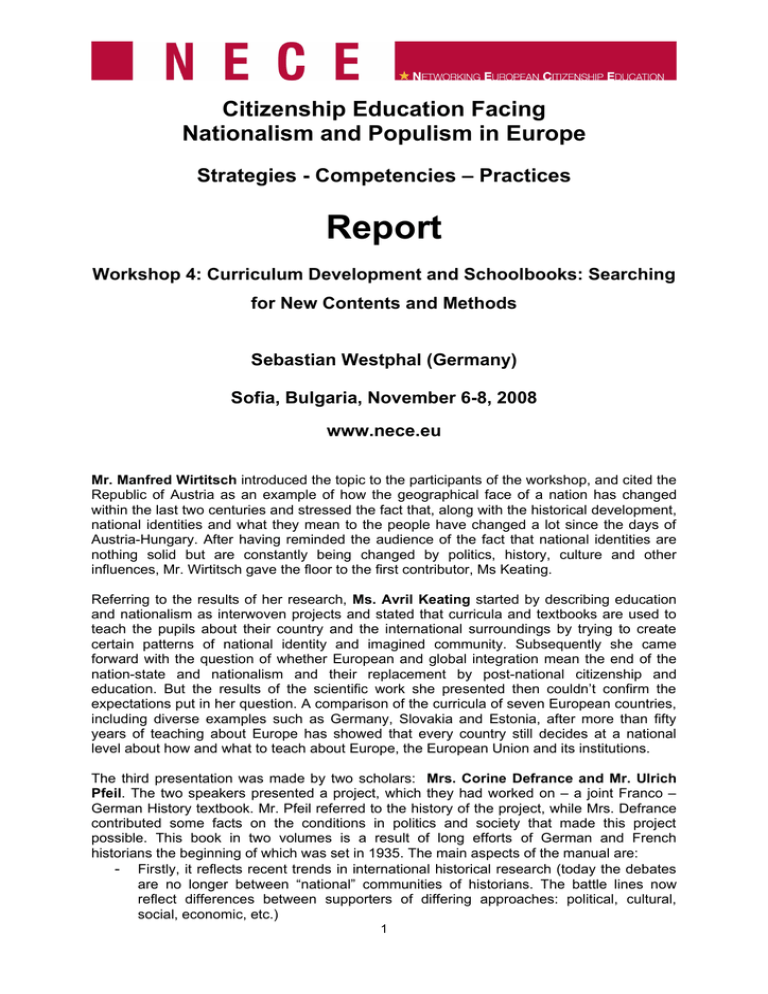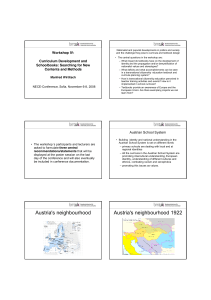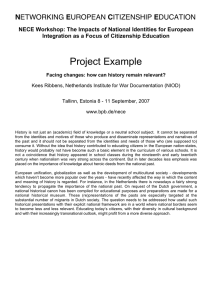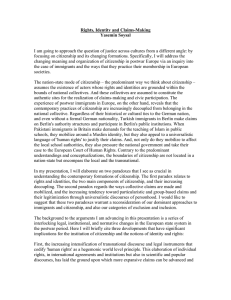Report Citizenship Education Facing Nationalism and Populism in Europe
advertisement

Citizenship Education Facing Nationalism and Populism in Europe Strategies - Competencies – Practices Report Workshop 4: Curriculum Development and Schoolbooks: Searching for New Contents and Methods Sebastian Westphal (Germany) Sofia, Bulgaria, November 6-8, 2008 www.nece.eu Mr. Manfred Wirtitsch introduced the topic to the participants of the workshop, and cited the Republic of Austria as an example of how the geographical face of a nation has changed within the last two centuries and stressed the fact that, along with the historical development, national identities and what they mean to the people have changed a lot since the days of Austria-Hungary. After having reminded the audience of the fact that national identities are nothing solid but are constantly being changed by politics, history, culture and other influences, Mr. Wirtitsch gave the floor to the first contributor, Ms Keating. Referring to the results of her research, Ms. Avril Keating started by describing education and nationalism as interwoven projects and stated that curricula and textbooks are used to teach the pupils about their country and the international surroundings by trying to create certain patterns of national identity and imagined community. Subsequently she came forward with the question of whether European and global integration mean the end of the nation-state and nationalism and their replacement by post-national citizenship and education. But the results of the scientific work she presented then couldn’t confirm the expectations put in her question. A comparison of the curricula of seven European countries, including diverse examples such as Germany, Slovakia and Estonia, after more than fifty years of teaching about Europe has showed that every country still decides at a national level about how and what to teach about Europe, the European Union and its institutions. The third presentation was made by two scholars: Mrs. Corine Defrance and Mr. Ulrich Pfeil. The two speakers presented a project, which they had worked on – a joint Franco – German History textbook. Mr. Pfeil referred to the history of the project, while Mrs. Defrance contributed some facts on the conditions in politics and society that made this project possible. This book in two volumes is a result of long efforts of German and French historians the beginning of which was set in 1935. The main aspects of the manual are: - Firstly, it reflects recent trends in international historical research (today the debates are no longer between “national” communities of historians. The battle lines now reflect differences between supporters of differing approaches: political, cultural, social, economic, etc.) 1 - - Secondly, it tries to cross French teaching practices with German ones (Far more than the interpretation of events, teaching practices have always been very different in the two countries. This manual seeks to overcome these differences and to create favourable grounds for pedagogical transfers); Thirdly, it tries to develop “a common historical awareness”( The general conception of the book reflects the concern to reduce as much as possible the juxtaposition of national points of view and replace them with transversal analyses). In the ensuing debate three groups were formed to discuss on the one hand the impact that textbooks and policies can have on the development of identity and the propagation and/or demystification of nationalist values and stereotypes and on the other hand advantages and disadvantages of identities in general. A starting point for discussion in the first group was the importance of textbooks in modern electronic-based communications and sources of information. The topic was viewed in the light of the role of the teacher in humanitarian studies. Textbooks should present the model approaches to a subject; they are not expected to be the only source of information. Contemporary teachers should feel more comfortable in the role of a group moderator that in that of “man of power”. Teachers need training for presenting history in a different from the traditional national-centric manner. The second group discussion started with the question; “Whose policy has the greatest impact on identity?” Among the vertical policies - on EU level, National level or School level – which has the strongest impact on forming the identity of contemporary pupils? The conclusion was that the EU policy directives have very little impact on forming an EU identity among pupils. One of the reasons stated was that there is not common EU curriculum concerning Citizenship education. The national school systems are conservative and nationcentric. The second topic of discussion was related to horizontal EU policies. It was agreed that the level of EU identity should not be seen in confrontation with national identities. The EU identity should be based on supra-national values, expressed in horizontal politics such as: human rights, minority rights, equal rights of men and women, abolishment of the death penalty, climate change policies, common culture heritage etc. The concluding discussion focussed on the advantages and disadvantages of a transnational citizenship education textbook and curricula planning system. Knowledge about the institutions of the European Union is important, but has to be complemented by a continuing reflection and discussion on the general problems of transnational citizenship. This discussion concluded by making several recommendations for further studies by agencies and actors in citizenship education: • Create a definition of ‘Transnational identity and citizenship’, • organise joint trainings for teachers and students from different nations; create broadly recognized quality criteria for textbooks, • analyse, evaluate and observe the textbooks used and the school situation of every EU member states from an outside perspective, • experiment with alternative pedagogical methods, which are useful for testing new ideas; establish a European fund with the purpose of supporting the development of secondary education quality criteria and pedagogical approaches to transnational citizenship education. 2




